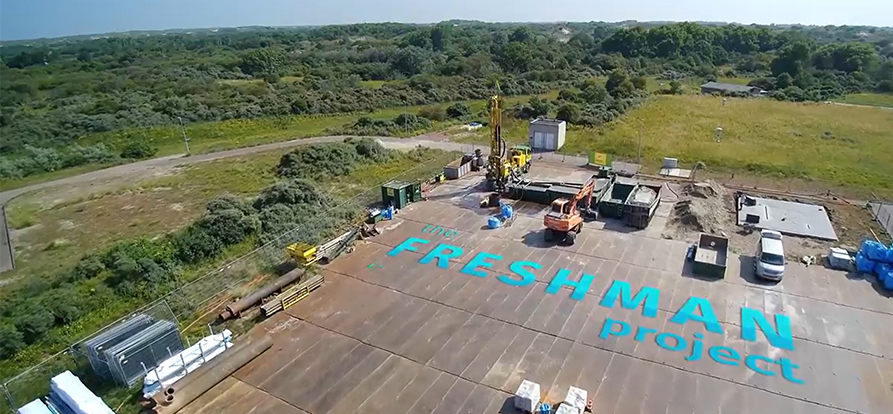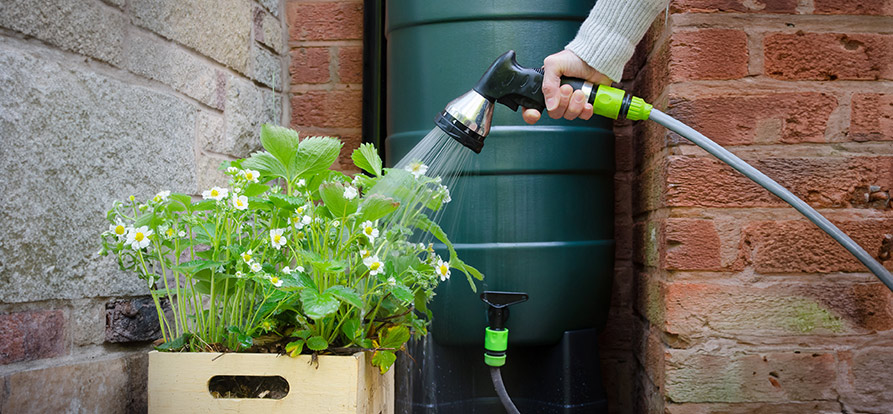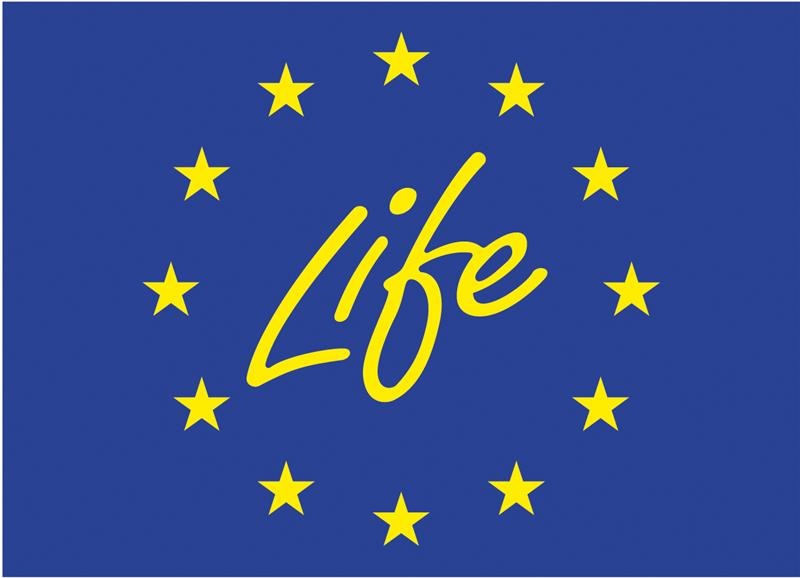
The Freshman-project
The Freshman project
The sweetness of brackish water
Water company Dunea supplies drinking water to 1.3 million people in the city of The Hague and surrounding municipalities (southwest Netherlands). Water supply is based on a managed aquifer recharge system, installed in the coastal dunes in the 1950s. Pretreated river water is infiltrated in the coastal dunes and pumped up again after a residence time of six weeks. The system is effective in maintaining a fresh groundwater body in the coastal dunes, however further expansion of this ‘strategic freshwater reserve’ is restricted by the presence of brackish groundwater underneath the freshwater body (Figure 1). We started a pilot project in February 2022 to investigate the potential of brackish groundwater as additional source of drinking water. Brackish groundwater is an excellent feedwater for medium-pressure reverse osmosis membranes and can be desalinated at acceptable energy input and costs. Extraction of brackish groundwater in the coastal dunes may also have strategic benefits, as it could result in a downward shift of the interface between fresh and brackish groundwater, enabling a gradual growth of the strategic freshwater body in the coastal dunes. This will increase the robustness of Dunea against potential interruption of river water supply to the dunes due to e.g. pollution incidents.
Brackish groundwater may thus provide an additional source of drinking water and its extraction may result in an increase in Dunea’s strategic fresh groundwater reserve1, 2. These combined benefits of brackish groundwater extraction are referred to as the Freshman concept (Figure 1) and have been tested in a field pilot in the coastal dunes of The Hague, lasting from February 2022 till March 2025 (3 years).

- Extraction of deep fresh groundwater in the coastal dunes may lead to upconing of brackish groundwater and to salinization of the freshwater well;
- Extraction of brackish groundwater can lead to downconing of the interface between fresh and brackish groundwater, enabling the gradual growth of the freshwater body and protecting the deep freshwater wells from salinization;
- The extracted fresh groundwater is purified to drinking water with conventional techniques;
- The extracted brackish groundwater is converted to fresh water (permeate) by reverse osmosis (RO). The permeate is mixed with the drinking water from step 3. The concentrate produced by the RO is discharged to the sewer system (pilot) or to the North Sea (full scale well field).
Methods


In 2021, a field pilot was set up at Dunea’s primary drinking water production site in the coastal dunes of The Hague.
The pilot consists of the following infrastructure:
- A brackish groundwater extraction well (well 2) with three individual well screens between 90 and 110 meters below ground level ;
- A fresh groundwater extraction well (well 1) with two individual well screens between 60 and 90 meters below ground level;
- Four monitoring wells in the vicinity of the extraction wells and two further away (wells M – R;);
- All wells are equipped with geohm cables to measure electrical resistivity, which is used to follow the groundwater dynamics (freshening or salinization) during brackish groundwater extraction;
- All wells are equipped with multiple piezometer screens to sample for water quality analyses and with pressure sensors to measure hydraulic heads (groundwater levels);
- A treatment facility for the collection and desalination of extracted brackish groundwater.
Result & Discussion
The reference situation before the start of the pilot is shown in Figure 6 (well P, July 2021). On January 31, 2022, the brackish groundwater extraction was switched on at a total rate of 50 m3/hr. A side stream of 20 m3/hr was treated by RO, yielding a freshwater recovery of 50-60%.

Top view of the brackish groundwater extraction well. Top view of well O, including multiple piezometer screens and a geohm cable.

Vertical profiles of electrical conductivity, electrical resistivity and chloride concentration at the pilot location (well P, July 2021). Fresh groundwater is present between ground level and 90 meters depth, brackish groundwater is present between 90-120 meters depth. Below a depth of 120 meters, the groundwater is saline.
After 1.5 years of brackish groundwater extraction, the interface between fresh and brackish groundwater has shifted downwards by 10-15 meters in the center of the well field (Figure 7). Moreover, a more subtle upward shift was observed for the interface between brackish and saline groundwater. This suggests that net freshening occurred in the aquifer during the extraction together with a narrowing of the brackish transition zone. These effects of the extraction on the salinity distribution were – albeit to a lesser extent – also observed at wells O and P, located 40 meters away from the abstraction. No effects were observed at the more remote wells Q and R, 100 meters away from the abstraction.
In following stages of the pilot, fresh groundwater will be extracted both with and without the extraction of brackish groundwater, to determine the robustness of the increased fresh groundwater reserve.
Development of the salinity distribution after 1.5 years of brackish groundwater extraction (at 30 – 50 m3/h). The isochlors are linearly interpolated between the sampled piezometers. Wells Q and R are not on the same line as the other wells but are plotted as reference on the left and right of the figures.
Conclusions
- Brackish groundwater can be extracted and desalinated without significant operational problems.
- Extraction of brackish groundwater leads to an increase of the fresh groundwater stock in the dunes.
- MAR applications in coastal aquifers may be enhanced by extraction of deep brackish groundwater.
How to produce drinking water from brackish groundwater
Freshman-project
Project progress
- July 2020 | Official start Freshman project Start Life grant for 'Freshman' project
- December 2021 | Brochure - The Freshman-project
- December 2021 | Notice boards placed near pilot site
- Notice board 1 - The freshman project
- Notice board 2 - Brackish groundwater abstraction
- Notice board 3 - Purification of brackish groundwater
- December 2021 | Well field and RO treatment installed and tested
- January 2022 | Start of brackish water abstraction and purification
- July 2023 | First monitoring report
- July 2024 | Second monitoring report
Publications
Only non-Dutch publications are listed below. Here you can find an overview of all Dutch publications.
- Zwolsman, G. (2025) ‘ A fresh look at protecting coastal water resources’, EU Research, Summer 2025 vol. (42), pp. 40 – 43
- Navigating the future of freshwater | Deltares
- Freshman to aid aquifer recharge - The Source
- In Face of Drought, the Netherlands Reverses Course to Save Water - The New York Times
- Dunea towards a multi-source drinking water system | Druppel January 2022
Latest news

Resultaten brak-grondwaterpilot LIFE-Freshman

Regentonactie afgelopen: een terugblik

Regenton met korting voor Dunea-klanten
Project Partners
Who's involved?
In addition to the research partners, stakeholders from the area are involved. Their advice and concerns also contribute to more and broader knowledge.
|
TU Delft VLAKWA Evides PWN Waternet Province of Zuid Holland HH Rijnland |
HH Delfland Municipality of The Hague Leiden Municipality Heineken Breweries Dune Conservation Foundation Berkheide Coepelduynen Foundation
|

About LIFE
The LIFE programme co-finances projects in the areas of resilience to water scarcity, droughts, forest fires or floods, adaptive technologies for economic sectors, and safeguarding natural resources. It provides action grants for best practice, pilot and demonstration projects that contribute to increased resilience to climate change. The climate sub-programme also promotes the development and implementation of EU policy on climate change adaptation, best practices and solutions for climate change adaptation, including ecosystem-based approaches and knowledge sharing.
In the programme this project is known as: LIFE19-CCA_NL_001222 LIFE_FRESHMAN.

Questions/contact
Nederlandse informatie over dit project
Do you have questions about this project? Go to the questions and answers page to find an immediate answer. Do you have other questions or are you a journalist? Please send an email to communicatie@dunea.nl.
